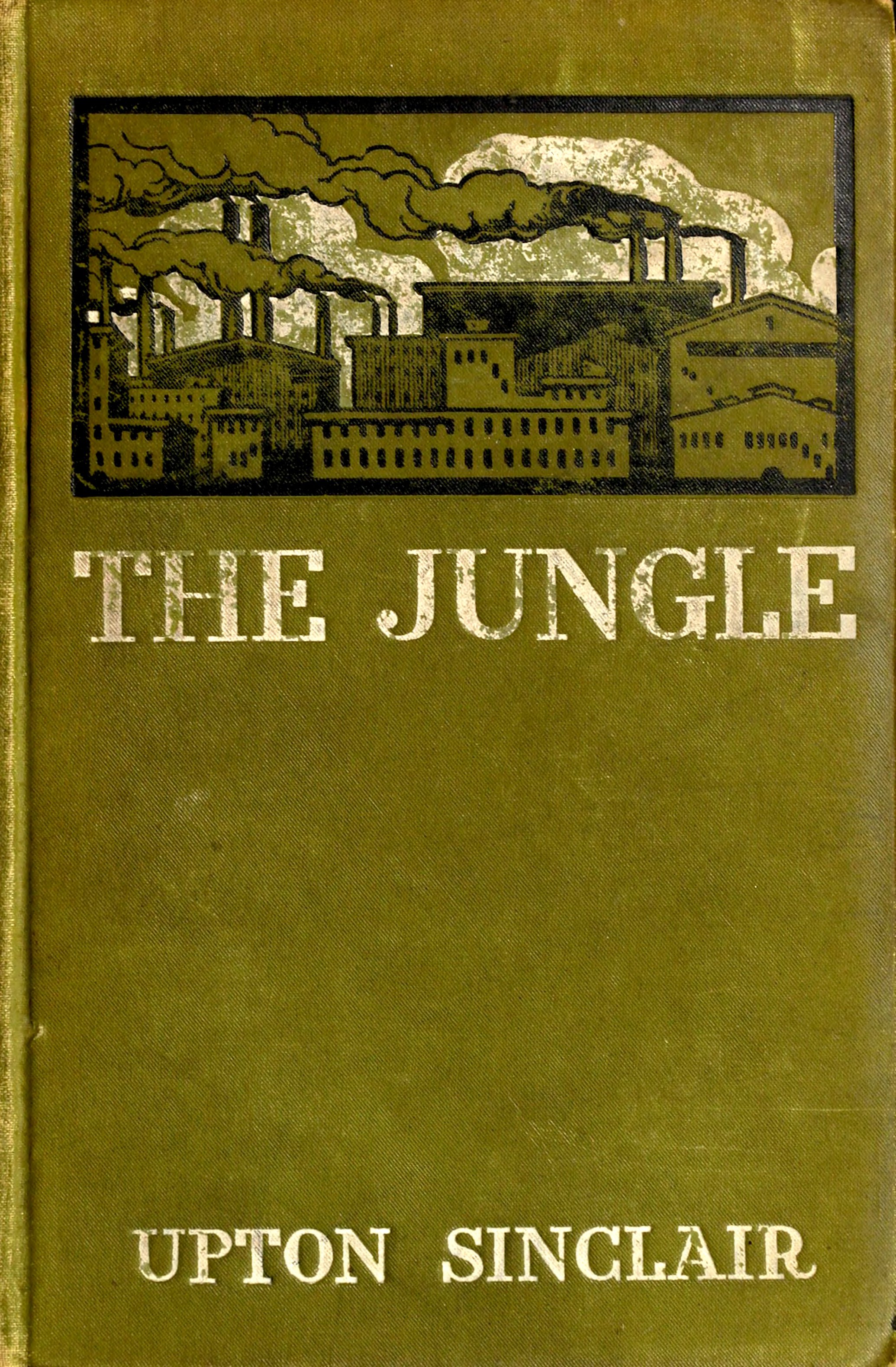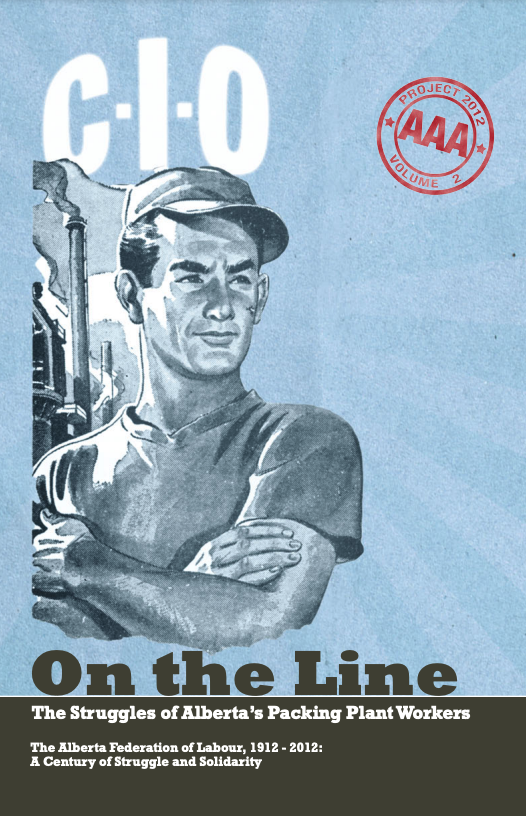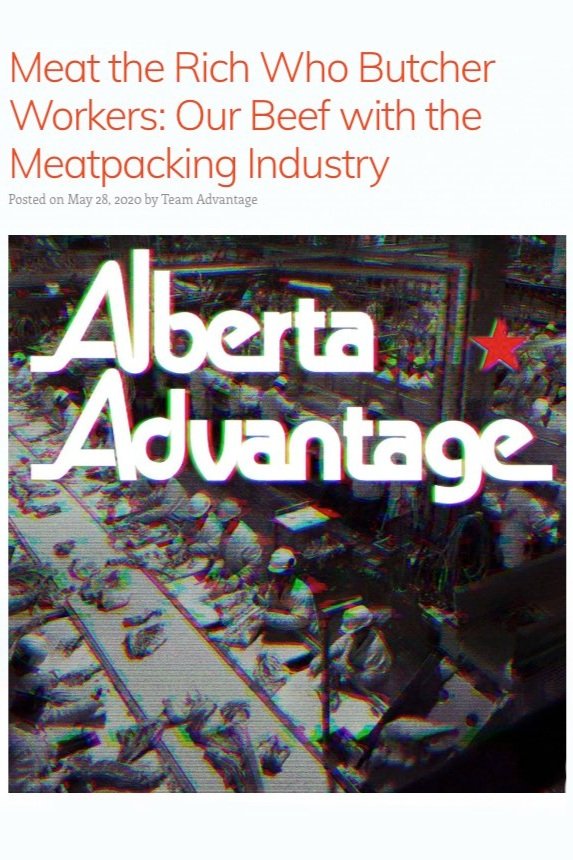More Guts Than Gainers
Tune into the fifth episode of A Little Bit Ritchie, to learn about the history of Gainers Meatpacking Plant, guts and all! The site of the 96th street condos, which overlook Mill Creek Ravine, was once home to the gigantic Gainers slaughterhouse—a keystone of Ritchie’s economic and social landscape. In this episode, We discuss Gainers success within the greater context of meatpacking and in relation to the Ritchie community. Further, we delve into the infamous 1986 Gainers strike. The story of Gainers is a tale of business, community, and the tensions that can arise when greed obscures ethics.
Subscribe Today:
Show Notes
Seven workers at the Mill Creek Gainers stand on short wooden benches in order to butcher full hogs hanging by hooks from a ceiling track inside the packing plant.
"Gainer's Limited, interior of meat packing plant, Edmonton, Alberta.", 1933, (CU164525) by McDermid Studio. Courtesy of Libraries and Cultural Resources Digital Collections, University of Calgary.
The inactive Gainers Packing Plant, photographed looking west across the ravine.
“Gainer's Meat Packing Plant,” 1988 June 29 (EA-207-362) by Phil Cox.
The active Gainers Packing Plant, photographed approaching the main office from the east at the top of the ravine.
Photograph included alongside article: Jac MacDonald, “Founder and namesake of Gainers started with $250,” Edmonton Journal, 1989 Nov. 12, 14.
"Gould-Leslie Limited/ Gainers Meats truck, [St. Catherines, Ontario?].", [ca. 1940], (CU144153) by Unknown. Courtesy of Libraries and Cultural Resources Digital Collections, University of Calgary.
The northside Swift’s packing plant, opened by J.Y. Griffin, would become the future home of Gainers and the infamous site of the 1986 strike.
"Griffin's packing plant," ca. 1909 (EA-793-39) by Gordon A. Wilkins.
Two employees at the North side Gainers butcher a hog.
"Gainers Meat Packing Plant - Pork Station Bert Jasperse," 1974 July 22, GR1989.0516/740 #5
An advertisement for Gainers meat products that appeared in the Edmonton Journal.
“Gainers’ Superior Meat – A Treat–To Eat,” Edmonton Journal, 1931 Sept. 5, 2.
Striking Gainers employers worked to maintain the efficacy of the strike by stopping temporary workers from accessing the plant.
Gordon Kent, “25 Years Later: United They Fought,” Edmonton Journal, 2011 June 13, 1.
Striking Gainers employers worked to maintain the efficacy of the strike by stopping temporary workers from accessing the plant.
Photograph published within pamphlet: Allan Chambers, “On the Line: The Struggles of Alberta’s Packing Plant Workers,” The Alberta Federation of Labour, 1912 – 2012: A Century of Struggle and Solidarity, 2012, 12, https://albertalabourhistory.org/wordpress/wp-content/uploads/2016/12/D3350-Booklet-On-the-Line.pdf.
"Edmonton Police at the Gainers plant, 1986,” Photograph included alongside article: Christina Battle, “Memory Work: Two powerful photographs of a 1986 workers’ strike suggest the dystopian consequences of collective forgetting,” CanadianArt, December 10, 2020
Demonstration in support of Gainers workers at the Legislature, Edmonton 1986.
Mike Tulley, Alberta Labour History.
Demonstration in support of Gainers workers at the Legislature, Edmonton 1986.
Mike Tulley, Alberta Labour History.
Demonstration in support of Gainers workers at the Legislature, Edmonton 1986.
Mike Tulley, Alberta Labour History.
The Chicago Union Stock Yards were an inspiration behind the development of a centralized meat packing industry in Edmonton.
"The Great Union Stock Yards of Chicago," 1878, by Walsh & Co., Library of Congress.
Additional Resources
To read more about the horrors surrounding employees at the Union Stock Yard, the impact of meatpacking on the human psyche, and the treatment of packinghouse workers, pick up Upton Sinclair’s harrowing novel, The Jungle.
Kuehne, Catherine’s short story, “Railroads and Ravines” in Heather Zwicker, ed. Edmonton On Location: River City Chronicles is an imaginatively written account of what it was like to grow up in Ritchie during Gainers heyday.
Allan Chambers, “On the Line: The Struggles of Alberta’s Packing Plant Workers” offers a detailed account of the 1986 Gainers strike.
Alberta Advantage Podcast discusses the historical and contemporary meatpacking industry in Alberta.
CBC shares video footage of the 1986 Gainers Strike.
Chicagology shares an interesting story of a fire at Chicago's Union Stock Yards.
To learn more about Edmonton’s meatpacking history, see photos and video footage of the 1986 Gainers strike, or watch many of the interviews mentioned in this episode, check out the Packingtown History Project.
ADDITIONAL INFORMATION
Vogel’s Black Bear
Vogel’s was the project of German-born butcher Wilhelm August Max Vogel, who immigrated to Canada in 1889. After practicing as a butcher for four years, he opened his shop on Whyte Avenue across from the Strathcona Hotel before moving to the Ravine a few years later.
Below is an audio recording of a story that Dr. Haeden Stewart shared in his conversation with Linnea Bell about Mill Creek. We wanted to include the story here as it is a peculiar story and sets the stage for some of the characters in the meatpacking industry.
A Strike at Swifts
The final home of Gainers, and the site of the 1986 strike, was originally built by J.Y. Griffin, with excavation starting in 1907. This plant was to be called Swift Canadian or Swifts. The J.Y. Griffin Company was a branch of Chicago’s Swift Firm; this expansion of Swifts from Chicago to Edmonton further demonstrates the influence of the Chicago packing industry on the development of the industry in Edmonton. On September 13, 1908, the plant was opened, and operation began. As is discussed in the episode, the industry was no stranger to strikes. In 1937, a strike at Swifts left 138 hogs and 19 cattle on the killing floor. Then in 1948, Swifts ended its collective bargaining agreement and a portion of production was exported. A 1966 addition to the plant doubled the capacity of Swifts operation. In 1980 Peter Pocklington purchased Swifts. From there, we know the rest.
The Catholic Church and the Gainers Strike
As part of the support from diverse members of Edmonton society, the Catholic Church played a crucial role in supporting the labour movement. The first event that the Church was involved with was a march that occurred on June 7th, where a rally organized by the Alberta Federation of Labour met up at the St. Francis of Assisi Catholic Church and marched to Gainers. From there, a church coalition was formed to act as mediators. Union representatives met with the coalition, which came to include clergy and lay people from a variety of Christian denominations. From there, there was a demonstration that involved carrying a cross and placing it just outside of the injunction’s restriction zone, where coalition members would meet for prayer. In addition to participating and leading demonstrations, the group became involved in the legal proceedings and staged public forums. The Coalition’s final prayer service was held on Dec. 15th.
LAND ACKNOWLEDGEMENT AND RECONCILIATION RESOURCES
Reconciliation Committee: A Little Bit Ritchie is more than entertainment and celebration. It is also a mutual learning method. The league has developed a Reconciliation Committee to foster this learning, which aims to work with the community to understand the history of the lands we call home. We hope to learn more about the rich indigenous history of the area and build stronger relationships with today's communities and residents. The committee hopes to explore what these lands mean to us and develop a deeper appreciation with bi-weekly meetings, which will create educational opportunities for the community through readings, discussions, and guest speakers.
In an effort to re-structure how we perceive and interact with the community we serve, the League would love to hear lesser-known stories about the lands currently known as Ritchie. These stories can help shape how we acknowledge these lands and support our goals of building an equitable, welcoming community for all through reconciliation and local action. Let us know how you show gratitude for the lands you call home or what brings you joy in your community. If you want to share a story, please contact Seghan at civics@ritchie-league.com.
LOCAL ORGANIZATIONS
The podcast “Our Foods: Chatting about Métis food Sovereignty” from the University of Alberta’s Faculty of Native Studies explores many aspects of food sovereignty in the Métis community.
The University of Alberta offers a free online course about Indigenous history in Canada.
Turtle Island Safer Spaces works with local businesses to facilitate learning and proactive allyship for Indigenous youth.
Mâmawô ayâwin at Edmonton Public Library is a platform for gathering and learning, developed from Edmonton Public Library’s response to the Truth and Reconciliation Commission of Canada's calls to action.
Alberta Labour History Institute shares the stories of working-folks across Alberta.
CORRECTIONS
__
NEXT TIME
On our next episode, we’ll take a look at community spaces—halls, greenspaces and playgrounds.
CALL TO ACTION
To show your support for the Ritchie Community League, consider The Ritchie Crew Subscription Service.
Haskap-y Birthday, Ritchie! In celebration of the Ritchie Community League’s Centennial, Kind Ice Cream is welcoming back their Haskap flavour exclusively to their Ritchie shop. A Haskap is a colourful berry that grows throughout the northern hemisphere and tastes like a combination of blueberry, raspberry, and black currant with a bit of added zing. This exquisite flavour is as local—and delicious—as they come.
Kind Ice Cream opened in 2019, right here in Ritchie, and quickly became the go-to meeting spot for families and friends looking for a quality sweet treat. Kind’s delectable ice creams are hand-crafted in small batches with exceptional ingredients and creativity and served with a commitment to reducing waste. Kind opened a second location in Highlands last summer, and in just three years, the ice creamery has achieved its aim to create two community-based shops where all are welcome.
Alongside the Haskap flavour, Kind is scooping a Mango Serrano flavour and their classic Gay OK flavour! Kind is donating $1 from every pint of Gay OK to local S2LGBTQ+ organizations, the CHEW Project, and the Edmonton 2 Spirit Society. To try all of these delectable treats, pop over to Kind Ice Cream today!
Follow us on Facebook, Twitter, and Instagram! Find us on Apple Podcasts, Amazon, Apple Podcasts, Stitcher, Spotify, and Google Podcasts, and don’t forget to give us a rating and a review.
If you have a story you would like to share in a future episode of A Little Bit Ritchie, send us an email at community-planning@ritchie-league.com.
CREDITS
A Little Bit Ritchie is brought to you by the Ritchie Community League Centennial Celebration Committee. Erin Fraser and Seghan MacDonald chair the committee. Our primary researcher is Linnea Bell. Elyse Colville wrote this episode. A Little Bit Ritchie is produced by Castria Communications and Media Solutions and hosted by Lydia Neufeld. This project is supported by the Edmonton Heritage Council and the City of Edmonton. Thank you to Tierra Connor for creating our artwork. Our theme music is “Twin Ponds” by Hemlock.



















